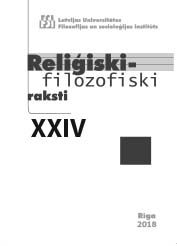Mīlestības un zināšanu kopsakara problemātika
Sērena Kirkegora darbos
The Problematics of the Interrelation Between
Knowledge and Love in the Works of Søren Kierkegaard
Author(s): Krišjānis LācisSubject(s): Existentialism
Published by: Latvijas Universitātes Filozofijas un socioloģijas institūts
Keywords: Søren Kierkegaard;
Summary/Abstract: In this article, the question asked by Jean-Luc Marion – “What love knows?” – is adressed to the works of Soren Kierkegaard, causing us to problematise the interrelation between love and knowledge along two traditional lines of interpretation, either viewing love as pertaining to the domain of the will, action, or understanding love as a passion. In the first case, Kierkegaard argues about a radical rupture between knowledge and will, which, guided by the imperative of neighbourly love, rather commands us to become the neighbour to the other, not to know the neighbour. Thus, the possibility of love’s knowledge in the works of Kierkegaard must always be subordinated to the notion of love as an existential actuality, giving existence the priority to limit the field of knowledge. In the second case, although love as a passion plays the central role in the general Kierkgaardian model of love, it can not be understood as an unambiguous form of knowledge, since this would mean to disregard the constitutive qualitative difference which Kierkegaard draws between the human and the divine.
Journal: Religiski-filozofiski raksti
- Issue Year: XXIV/2018
- Issue No: 1
- Page Range: 188-213
- Page Count: 26
- Language: Latvian

